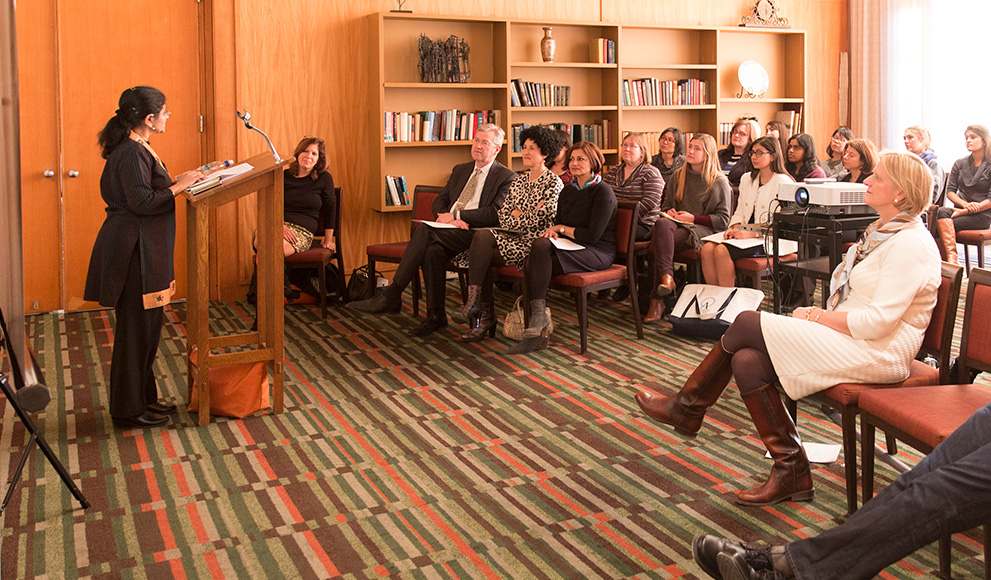Wellesley Partners With Ashoka University, India's First Private Ivy League-Caliber Institution

Founded by entrepreneurs passionate about education standards in India, including Harshbeena Sahney Zaveri '82, Ashoka University is the "first private Ivy League-caliber liberal arts institution in India." Over the course of 2015, Wellesley faculty and staff explored a partnership agreement with Ashoka and, on Thursday, January 21, held a signing ceremony celebrating the new partnership.
"The collaboration between Wellesley College and Ashoka University, Delhi, India, promises to be a deeply meaningful international partnership in higher education," said Neelima Shukla-Bhatt, Associate Professor and Director of Wellesley's South Asia Studies Program. "[Both] institutions share the foundational principles of academic excellence as well as service to humanity; and importantly, they are firmly committed to the empowerment of women."
Shukla-Bhatt, Layli Maparyan, Katherine Stone Kaufmann '67 Executive Director of the Wellesley Centers for Women, and Joanne Murray, Founding Director of the Madeleine Korbel Albright Institute for Global Affairs, visited Ashoka in February of last year. The visit yielded promising possibilities for faculty exchange, curricular consultation, research collaborations with the Wellesley Centers for Women, and collaboration with the Madeleine Korbel Albright Institute for Global Affairs.
Ashoka has existing partnerships with other top schools the U.S., including the University of Pennsylvania, Carleton College, the University of Michigan, Yale, and UC Berkeley, and throughout the world, including Kings College, England, and SciencePo, in France. Speaking at the signing as a founder of Ashoka and an alumna of Wellesley, Zaveri said she is "especially proud of the alliance we’ve forged between our two schools." Quoting Ashish Dhawan, Ashoka's Principal Founder she said, "the Ashoka-Wellesley MOU is 'the most comprehensive partnership that Ashoka has, and is in the truest sense of the word: a collaboration.'"
The signed memorandum of understanding represents a five-year agreement. The main components of the proposed academic program include: the joint development of innovative course content; research between faculty members and students in the areas of mutual interest; faculty exchange; and the possibility of wintersession programs, student exchange and study abroad programs.
Further, as part of the agreement, the Wellesley Centers for Women has proposed to collaborate with Ashoka to support the development of the Center for Research on Gender and Sexuality, and the Albright Institute has proposed the sharing of their curricular and pedagogical global affairs model. A small cohort of Ashoka students was on campus to observe the 2016 Albright Institute wintersession.
Zaveri is Ashoka's sole female founder and, as such, she said she feels a special responsibility in driving the university’s aspirations of women empowerment. "As the Chief mentor of Ashoka’s women students, I continue to rely on the perspective I gained through Wellesley and the [Business Leadership Council]," Zaveri said. "I am personally excited to observe the Ashoka faculty, as I had at Wellesley, inculcate the values of diversity, inclusion, and to encourage their students develop into leaders who are driven by their own special visions of service, breaking the barriers of privilege, to create a more inclusive world."
Another speaker at the ceremony, Karen Pechilis, Professor of Comparative Religion at Drew University, New Jersey, gave a lecture on a 12th century Tamil (South Indian) woman poet as a model of feminism from India’s cultural history entitled, "Women in Leadership: Tracing the Perspectives of Ancient South Asian Feminists to Today."
Shukla-Bhatt explained that it is believed the poet prayed to her Lord, Shiva, to release her from the bondage of this world and take her to heaven. Shiva asked her instead to transform her surroundings into heaven with imagination and service and gave her strength to do so. Pechilis, in her lecture, suggested that the collaboration between Wellesley and Ashoka, two institutions dedicated to transforming the world, can be envisioned in terms of creativity associated with imagination, the spirit of service, and the strength of women empowered through holistic education.
